Brief look at some of our experts, and scientists on location and students whose work we've helped. (Check out project examples to see some of our other project experts)
Founder:
Dr. Deborah Brosnan
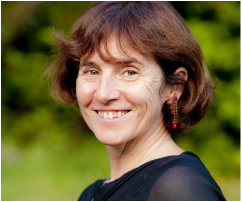
Center founder Dr. Brosnan is a scientist on the front lines, advocating and acting to ensure all stakeholders have access to the best technical and scientific expertise. Born in Ireland, her love of the ocean and science was nurtured by the tidepools and undersea habitats of the western Atlantic; she became the first woman scuba diver at her university. She gained her Ph.D. with Jane Lubchenco and Bruce Menge in Oregon, USA. In addition to President of the Center, she is professor of biology (adj) at Virginia Tech and faculty in the Global Forum for Urban and Regional Resilience, and the Global Change Center. She is environment and policy scientist at the One Health Institute U. California Davis, and a research associate with the Smithsonian Institution Natural History Museum. She has been visiting scholar at Stanford University, visiting faculty at NW School of Law, and a Whitely fellow at U. Washington. She created the Sustainable Ecosystems Institute and built it into the go-to organization for government and others seeking science-based solutions to environmental problems, recruiting 700+ peer nominated scientists to serve on its conservation network. In 2014 she restructured the group into the Brosnan Center to better sever the needs of clients and leverage academic talent. Under her leadership the group has successfully used science to break deadlocks on issues of national significance, including Everglades Restoration, endangered species, Missouri River, and more.
Dr. Brosnan's is an expert on extreme events, hazards and climate change, especially on coastal and marine systems and communities, and on endangered species. Her work has taken her diving under active volcanoes to study how eruptions affect coral reefs and fisheries, and into post-tsunami and post-hurricane coastal habitats and communities. She advises governments, institutions, and the private sector. As a scholar with deep roots in practicality, she works in diverse situations and habitats around the world. She serves on several organizational boards; She is chair of the international Irish diaspora of scientists, engineers and technologists,U.C. Davis SeaDoc Society, PADI Project AWARE, and has severe on the National Science and Policy Forum, OSU College of Forestry, and the Santa Barbara Group, chaired a blue ribbon committee to develop a scientific code of ethics for the US Dept of Interior. She was named to the Irish Education 100 in Dec 2014 for her contribution to higher learning in the USA. She publishes scientific and popular articles provides testimony before U.S. House and Senate committees, is frequent speaker at gatherings, universities, and conferences. She is also an exhibited underwater photographer with a strong interest in science and art. In her spare time Dr. Brosnan scuba dives, swims, runs, hikes, and plays African marimba music. You can contact her at [email protected].
(Image courtesy of Dorothy Davis. Also thanks to Jean Philippe PITER, http://www.purestbarth.com/pure8/free-spirits.htm
Dr. Brosnan's is an expert on extreme events, hazards and climate change, especially on coastal and marine systems and communities, and on endangered species. Her work has taken her diving under active volcanoes to study how eruptions affect coral reefs and fisheries, and into post-tsunami and post-hurricane coastal habitats and communities. She advises governments, institutions, and the private sector. As a scholar with deep roots in practicality, she works in diverse situations and habitats around the world. She serves on several organizational boards; She is chair of the international Irish diaspora of scientists, engineers and technologists,U.C. Davis SeaDoc Society, PADI Project AWARE, and has severe on the National Science and Policy Forum, OSU College of Forestry, and the Santa Barbara Group, chaired a blue ribbon committee to develop a scientific code of ethics for the US Dept of Interior. She was named to the Irish Education 100 in Dec 2014 for her contribution to higher learning in the USA. She publishes scientific and popular articles provides testimony before U.S. House and Senate committees, is frequent speaker at gatherings, universities, and conferences. She is also an exhibited underwater photographer with a strong interest in science and art. In her spare time Dr. Brosnan scuba dives, swims, runs, hikes, and plays African marimba music. You can contact her at [email protected].
(Image courtesy of Dorothy Davis. Also thanks to Jean Philippe PITER, http://www.purestbarth.com/pure8/free-spirits.htm
Center Scientists, Advisors, and Collaborators
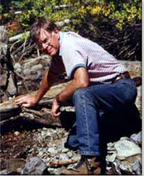
Dr. Terry Erwin Curator of Coleoptera, Smithsonaian Institution.
Recognized as a leading biologist who brought awareness of taxonomy and biodiversity science to the world. Terry Erwin is curator of Coleoptera at the Smithsonian Institution. In 1981 Terry published a short paper hypothesizing that there were as many as 30,000,000 species rather than the 1 million described at the time. This paper helped to launch a major discussion on species diversity and the importance of understanding and identifying life forms on earth. He is known for his work in the Amazon, and his canopy studies which he used to explore beetle fauna of Panamian tree species (popularized in the opening scene of the movie Possession based on A S Byatt’s book). He continues his studies of biodiversity in the western Amazon Basis including Ecuador is author of several key books and publications. Terry provides critical expertise in connecting our work with the foundations of biological science, and has played an important role in our work on dengue fever and conservation planning based on biodiversity and landscapes.
Recognized as a leading biologist who brought awareness of taxonomy and biodiversity science to the world. Terry Erwin is curator of Coleoptera at the Smithsonian Institution. In 1981 Terry published a short paper hypothesizing that there were as many as 30,000,000 species rather than the 1 million described at the time. This paper helped to launch a major discussion on species diversity and the importance of understanding and identifying life forms on earth. He is known for his work in the Amazon, and his canopy studies which he used to explore beetle fauna of Panamian tree species (popularized in the opening scene of the movie Possession based on A S Byatt’s book). He continues his studies of biodiversity in the western Amazon Basis including Ecuador is author of several key books and publications. Terry provides critical expertise in connecting our work with the foundations of biological science, and has played an important role in our work on dengue fever and conservation planning based on biodiversity and landscapes.
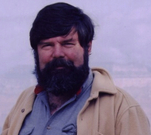
Dr. James Quinn Professor University of California Davis, Information Center for the Environment (ICE). Dr Quinn is a leading quantitative ecologist who has pioneered developments in environmental information science and technology and applies them to endangered species forest planning and management, and climate change. He is the founder and director of ICE which specializes in the development and dissemination of geospatial data and technologies; the development of robust data architectures dedicated to the cataloging of global environmental information; and the creation of decision support systems aimed at improving natural resources management. Dr Quinn has served on several scientific review panels addressing species and landscape challenges.
The Brosnan Center and Dr Quinn and the Information Center for the Environment are working in close collaboration in developing new approaches and capabilities for key projects.
The Brosnan Center and Dr Quinn and the Information Center for the Environment are working in close collaboration in developing new approaches and capabilities for key projects.

Dr. Terrie Klinger Professor University of Washington. Combining scientific excellence with a commitment to bringing science to ocean management, Dr Klinger is Associate Professor, School of Marine and Environmental Affairs and Stan and Alta Barer Endowed Professor of Sustainability Science., and a research scientist at the UW Friday Harbor Laboratories. Dr Klinger uses empirical data to test the application of ecological theory to marine environmental policy and management. The biological and ecological impacts of ocean acidification, ecosystem approaches to management, global change and finding solutions to energy needs are among her key research themes. She is a dedicated mentor to students interested in rigorous scientific approaches to ocean issues. Dr Klinger is a valuable advisor to the Center and has helped guide student projects. Dr Klinger serves as Governor’s Appointee, Northwest Straits Commission, Chair, Olympic Coast National Marine Sanctuary Advisory Council and Chair, Phycological Society of America Conservation and Policy Committee.
Mr David Graham: Center's Special thanks for his leadership and support of coastal resilience projects in restoration of coral reefs/beaches St Barthelemy.
St Barth Center:
Currently on location at St Barths studying and implementing science-based solutions, and collaborating with other scientists worldwide:
Cheryl Miller
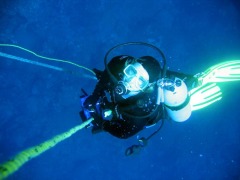
Cheryl Miller is the lead coral reef scientist at the Brosnan Center in St Barths, bringing 14 years of experience in mapping and monitoring of coral reef, artificial reef, mangrove, and seagrass habitats to the monitoring and restoration activities at the Center. She is leading the effort to document the condition and composition of coral reef communities on St Jean reef through the establishment of permanent monitoring sites. She is also implementing a pilot project to test the efficacy of reef restoration techniques including coral transplantation, transplantation of coral larval attractants such as red coralline algae, and removal of fleshy macroalgae from overgrown nearshore reef areas with high abundances of urchins and herbivorous fishes.
Cheryl is a doctoral student at the Nova Southeastern University Oceanographic Center in Florida. Combining the fields of ecology and genetics, her dissertation focuses on the distribution and systematic position of the coral Siderastrea, a coral which is commonly found on the reefs of St. Barthelemy. Cheryl is using molecular techniques to identify potential genetic differences in convergent morphotypes between S. siderea and S. radians. The results have important implications for coastal resource management and balancing the competing interests and needs of people and our coastal habitats. Cheryl’s main research interests focus on coral reef restoration and landscape ecology with a specific interest in a bioindicator approach to the assessment of coastal nutrification. Her interests and extensive background in combining disciplines and bringing science into regulatory environments coincide with the mission and activities of the Brosnan Center. Cheryl can be reached at the Brosnan Center and via email at [email protected].
Meghan Massaua

Meghan Massaua is the principal research assistant and coordinator at the Brosnan Center in St Barthelemy. She manages the lab projects and is a key participant in the science and science-policy activities. A graduate student from University of Washington's School of Marine Affairs, Meghan's interests lie in the intersection of science and policy. As a marine biologist, she is directly involved in the scientific research, yet she also has a keen interest in applying science to decision making. Meghan's previous research experience includes studying wildlife management in the grasslands of East Africa, investigating spawning cycles of bay scallops in Nantucket, and working in the mudflats of the Oregon Coast studying the distribution and abundance of bay clams. Her policy experiences have included working with the Maine Marine Resources Committee on issues surrounding the lobster fishery, where she learned about policy process firsthand. She enjoys swimming, diving, skiing, hiking, and sailing, and is happiest on the water. You can contact her at at the Brosnan Center and via email: [email protected]. We are proud to announce that Meghan was awarded the highly-competitive J. A. Knauss Fellowship to work on ocean policy with the Executive Branch of Government. CONGRATULATIONS MEGHAN!
Claire Simeone
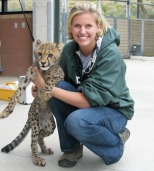
Claire Simeone works at the Center on emerging diseases linking wildlife and human health. She is currently researching the economic impact of Dengue fever on Saint Barthélemy, and is working with the Brosnan Center to research and implement an innovative project using copepods for mosquito control. In addition, she is finishing up her final year as a veterinary student with a clinical year at the Virginia-Maryland Regional College of Veterinary Medicine, she has a focus of wildlife and international medicine. Her interests lie in ecosystem health, wildlife conservation, and One Health, which combines veterinary medicine, human medicine, and public health to tackle issues such as emerging infectious diseases and conservation management. You can contact her at: [email protected].
Ralph Clark
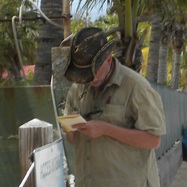
One of the foremost coastal engineers, award-winning Ralph Clark has worked on beaches around the world. For over thirty years as a chief engineer and architect of Florida's beach renourishment and sustainability programs. Mr Clark has studied and designed programs to sustain these vital coastal habitats. An expert in the study of design and impacts of major events like hurricanes on beach erosion and structural stability, he is one of the main authorities in this area and sought after for his expertise and knowledge. Mr Clark has participated in several coastal habitat restoration and design programs for the Center and written influential reports.
Alexandra Troyer
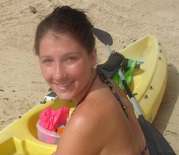
Summer Intern, Alexandra Troyer is an undergraduate in biology at DePauw university, Indiana. Alexandra joined us this summer and participated in several projects including her own independent study of conch abundance and migration in Grand Cul de Sac. Her study and report (available on this site) contributed to management decisions on the conservation and actions for the bay.
© 2012 by Dr. Deborah Brosnan. All rights reserved.
